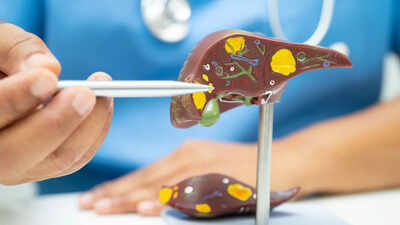Liver cancer is a growing global health concern and is often linked to lifestyle and dietary habits. While genetic factors and environmental exposures do play a role, much of the risk for liver disease is influenced by everyday choices. The liver, one of the most vital organs in the body, performs critical functions such as detoxifying chemicals, processing nutrients, and producing essential proteins. Chronic damage to the liver can quietly progress over years, eventually leading to conditions like cirrhosis, fatty liver disease, and liver cancer.Dr. Saurabh Sethi, a gastroenterologist, recently shared insights on four common habits that can significantly increase liver cancer risk. Understanding these risks and making conscious changes can help safeguard your liver health.
Everyday habits that could raise your risk of liver cancer

Processed meats, such as bacon, sausages, and hot dogs, are widely consumed around the world. However, these foods are packed with nitrates, preservatives, and chemical additives that can accumulate in the liver over time. The liver works tirelessly to filter and detoxify harmful substances, and frequent exposure to these chemicals increases the risk of liver cell damage and chronic inflammation.Inflammation is a key factor in the development of liver diseases, including fibrosis, cirrhosis, and ultimately liver cancer. Even occasional consumption of processed meats contributes to the cumulative stress on your liver. Dr. Sethi emphasises that choosing fresh, minimally processed protein sources—like lean meats, fish, legumes, and plant-based alternatives—can significantly reduce liver burden and support long-term health.

Alcohol is one of the most well-known contributors to liver disease, yet many people underestimate its long-term impact. Dr. Sethi points out that all types of alcohol, including red wine, beer, and spirits, can harm the liver when consumed regularly. The liver metabolizes alcohol, and excessive intake leads to fat accumulation, inflammation, and scarring—a condition known as cirrhosis.Even moderate alcohol consumption has been linked to liver cell damage over time, which can increase the likelihood of liver cancer. Reducing alcohol intake, or eliminating it entirely, is one of the most powerful steps to protect the liver. Supporting liver health also involves maintaining hydration, eating nutrient-rich foods, and avoiding additional toxins that could compound liver stress.

Sugary drinks, including sodas, sweetened juices, and energy drinks, are a modern dietary concern. These beverages are high in fructose, which the liver metabolizes into fat. Over time, excessive sugar intake can lead to non-alcoholic fatty liver disease (NAFLD), a condition characterized by fat buildup in liver cells without the influence of alcohol.NAFLD is increasingly prevalent worldwide and is recognized as a significant risk factor for liver cancer. Dr. Sethi explains that replacing sugary drinks with water, unsweetened teas, or natural fruit-infused beverages can help reduce liver fat, improve metabolic health, and lower cancer risk. This small dietary change can have a substantial long-term impact on liver function and overall wellness.

Deep-fried foods, such as French fries, chips, and fried chicken, are often high in unhealthy fats and advanced glycation end-products (AGEs), which contribute to oxidative stress in the body. Regular consumption of fried foods can trigger chronic liver inflammation, impair liver function, and increase the risk of fibrosis. Chronic inflammation is a major driver of liver disease progression and cancer development.Dr. Sethi advises replacing fried foods with grilled, baked, steamed, or lightly sautéed alternatives. These cooking methods preserve nutrients while minimizing harmful compounds that strain the liver. Additionally, combining a liver-friendly diet with regular physical activity can help maintain a healthy weight and further reduce cancer risk.
Understanding liver cancer
Liver cancer occurs when abnormal cells in the liver begin to grow uncontrollably. The liver is located in the upper abdomen, close to the stomach, intestines, gallbladder, and pancreas. Within the liver, there are intrahepatic bile ducts—small channels that carry bile, a digestive fluid, throughout the organ.The liver plays a vital role in keeping the body healthy. Its main functions include:
- Storing essential nutrients
- Removing waste products and old or damaged blood cells
- Filtering and processing chemicals from food, alcohol, and medications
- Producing bile, which helps digest fats and eliminate toxins

Symptoms of liver cancer
In the early stages, liver cancer often develops silently without noticeable signs. According to CDC, as the tumor grows, symptoms may begin to appear. It’s important to note that these signs are not exclusive to liver cancer and may be linked to other medical conditions. Anyone experiencing these symptoms should consult a healthcare professional for proper evaluation.
- Persistent discomfort or pain in the upper right abdomen
- Swelling or bloating in the abdomen
- A firm lump just below the right rib cage
- Pain that spreads to the right shoulder blade or back
- Jaundice, or yellowing of the skin and eyes
- Easy bruising or bleeding
- Ongoing fatigue or unusual weakness
- Nausea and vomiting
- Reduced appetite
- Unexplained weight loss
Lifestyle strategies to protect your liver
- Balanced and nutrient-rich diet
Eating a diet rich in fruits, vegetables, whole grains, and lean proteins provides essential nutrients that support liver function. Foods high in antioxidants, like berries and leafy greens, help reduce oxidative stress and inflammation in the liver. Limiting processed and high-sugar foods reduces fat buildup and lowers the risk of fatty liver disease.
- Avoiding harmful substances
Eliminating or minimizing alcohol, processed meats, sugary drinks, and deep-fried foods reduces liver strain. These substances can cause inflammation, fat accumulation, and long-term damage, increasing the risk of liver disease and cancer.
- Regular physical activity
Engaging in moderate exercise, such as walking, swimming, or cycling, helps maintain a healthy weight, improves metabolism, and reduces fat accumulation in the liver. Exercise also supports overall cardiovascular health and reduces the risk of chronic diseases that indirectly affect liver function.
- Maintaining a healthy weight
Obesity is a major risk factor for non-alcoholic fatty liver disease (NAFLD), which can progress to liver cancer. Maintaining a healthy weight through diet and exercise reduces fat accumulation in liver cells and supports long-term liver health.Chronic stress can negatively affect metabolism and hormonal balance, indirectly impacting liver health. Practices like meditation, yoga, deep breathing exercises, or mindfulness can help reduce stress and support overall organ function.
- Regular medical check-ups
Routine liver function tests and health screenings help detect early signs of liver disease. Early detection allows for timely interventions and lifestyle adjustments that can prevent progression to serious conditions.Drinking sufficient water helps the liver flush out toxins more efficiently and supports overall metabolic processes.
- Avoiding environmental toxins
Limiting exposure to chemicals, certain medications, and harmful supplements that can burden the liver is also important for long-term liver health.Disclaimer: This article is for informational purposes only and should not be considered medical advice. Liver cancer risk and prevention vary from person to person. Always consult a qualified healthcare professional before making changes to your diet, lifestyle, or treatment plan.Also Read | High blood pressure in children may increase heart death risk by 50% by midlife; new study reveals










